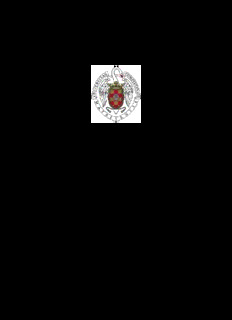
Aspectos interculturales en la obra del autor alemán de origen kurdoiraquí Sherko Fatah PDF
Preview Aspectos interculturales en la obra del autor alemán de origen kurdoiraquí Sherko Fatah
UNIVERSIDAD COMPLUTENSE DE MADRID FACULTAD DE FILOLOGÍA Departamento de Filología Alemana TESIS DOCTORAL Aspectos interculturales en la obra del autor alemán de origen kurdo- iraquí Sherko Fatah MEMORIA PARA OPTAR AL GRADO DE DOCTOR PRESENTADA POR María Rosa Falcón Quintana Directores Ana Pérez López Ana Ruiz Sánchez Madrid, 2015 © María Rosa Falcón Quintana, 2015 Agradecimientos UNIVERSIDAD COMPLUTENSE DE MADRID FACULTAD DE FILOLOGÍA Departamento de Alemán ASPECTOS INTERCULTURALES EN LA OBRA DEL AUTOR ALEMÁN DE ORIGEN KURDO-IRAQUÍ SHERKO FATAH MEMORIA PRESENTADA PARA OPTAR AL GRADO DE DOCTOR POR María Falcón Quintana Bajo la dirección de: Dra. Ana Pérez López Dra. Ana Ruiz Sánchez Madrid, 2014 UNIVERSIDAD COMPLUTENSE DE MADRID FACULTAD DE FILOLOGÍA Departamento de Alemán ASPECTOS INTERCULTURALES EN LA OBRA DEL AUTOR ALEMÁN DE ORIGEN KURDO-IRAQUÍ SHERKO FATAH Tesis doctoral que presenta Dña. María Falcón Quintana para la obtención del Título de Doctora en Filología Alemana, bajo la dirección de las Dras. Ana Pérez López, de la Universidad Complutense de Madrid, y Ana Ruiz Sánchez, de la Universidad Autónoma de Madrid. Madrid, 2014 Agradecimientos A mis padres. 3 4 Agradecimientos Agradecimientos Son muchas las personas que han contribuido a esta tesis doctoral. Quiero expresar aquí mi más sincero agradecimiento a todas ellas. En especial, a las Dras. Ana Pérez y Ana Ruiz, directoras de esta tesis, que me han acompañado en este largo camino con generosidad y pazciencia. Al Dr. Gino Chiellino, a los compañeros del grupo de investigación (Szilvia, Adrian, Sandrine, Raluca, Jesús, Sol) y a los participantes de los seminarios de la Universidad de Augsburgo, por compartir freundlich und solidarisch sus ideas y su tiempo conmigo. Al escritor Sherko Fatah, al periodista Manuel Martorell y a su amigo Abed Abdulsattar, por responder siempre con gran interés a todas las preguntas. A mi padre, que está siempre presente, a mi madre, la principal responsable de que este trabajo llegara a buen puerto, y a mis hermanos, por darme la fortaleza necesaria para acabar esta tesis. A Lukas y a Sven, los que más han sufrido mis ausencias, por su comprensión y amor. A todos los amigos, que confiaron en mi capacidad para finalizar este trabajo y que me animaron a seguir hasta el final. En especial, a Marga y a Isabel. A todas las personas que han aportado su grano de arena a este trabajo. Sobre todo, a Jorge, a Clara, a Paco, a Ana Mª y a Chus. A todos, gracias. 5 6 Abstract Abstract 7 8 Abstract Abstract Title: Intercultural elements in the work of the German author, of Iraqi Kurdish origin, Sherko Fatah. The object of study of the present research is the work of the German author Sherko Fatah (b.1964). In particular, we aim to analyse the presence of intercultural elements in his first four literary texts (Donnie, Im Grenzland, Onkelchen and Das dunkle Schiff) as well as to determine if there is an evolution in the treatment of these aspects throughout them. For this purpose we have divided the work in four chapterss. In the first chapter we have examined the present state of investigations, in the second chapter we have set out the theoretical foundations that we have found to be most suitable for the purposes of this study, in the third chapter we have carried out an exhaustive analysis of the four works from a mainly intercultural perspective and in the last chapter we have presented the conclusions. The designation ‘intercultural literature in Germany’ refers to literary texts by authors who write in German but who come from other cultural memories and languages. Although the main body of the intercultural literature in German language in the recent years has originated mainly in an immigration context, there are also authors from other cultural memories and languages who have chosen to write intercultural literature in German for reasons that are not exclusively sociocultural and economic. This is the case of Fatah, born in Germany, of a German mother and an Iraqi Kurdish father, and who lived for prolonged periods of time in his father’s hometown, Suleimaniya, and has studied Philosophy and Art history in Germany. He has published six works of fiction (with Jung und Jung and Random House), which he wrote in his mother tongue, German, also his ‘writing language’. Migration and exile are some of the themes that we find in his literary output. He received the Hilde-Domin Prize for Literature in Exile from the city of Heidelberg for Im Grenzland and Onkelchen, a prize awarded since 1992 to authors who live (or have lived) in exile in Germany and who publish their works in German. Although it is not the case of Fatah, the jury valued his descriptions of violence, war and the border 9
Description: